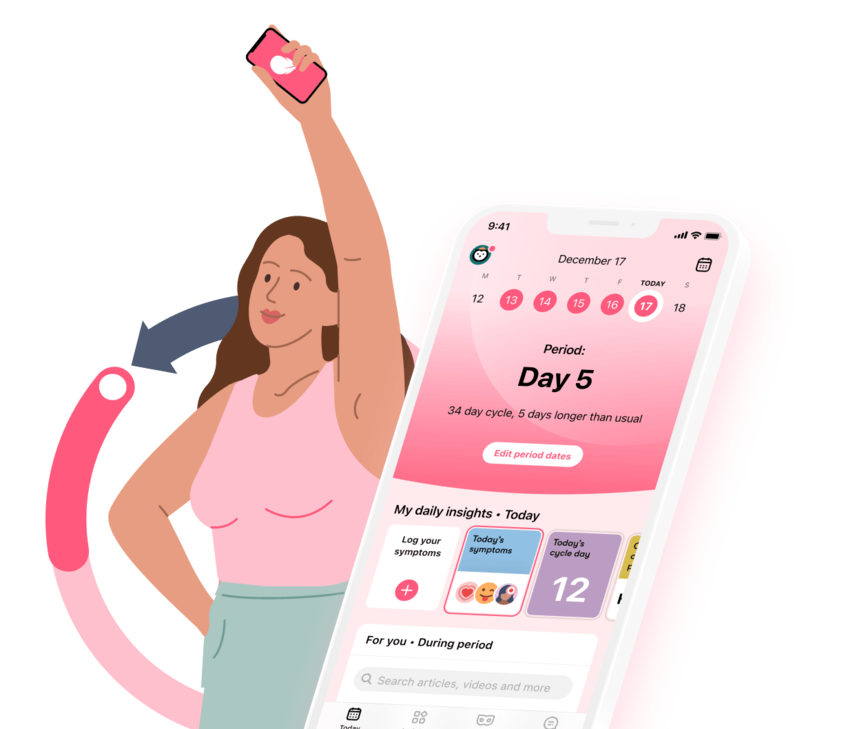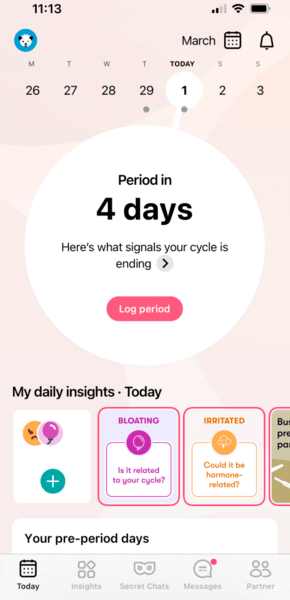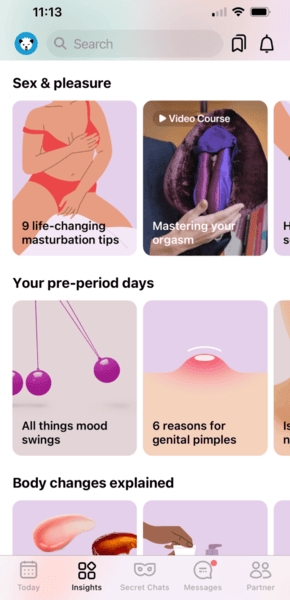Tell Flo about yourself and log how you’re feeling.
Our clever tech will help predict where you are in your cycle (and what you might expect now and in the future) so you can understand your body even better.
No wonder 420 million women and people who have periods trust Flo².
90%
of users say Flo accurately predicts period start³
of users say Flo helps improve how they manage menstrual symptoms⁴
Get accurate period predictions
Know when your period’s likely to arrive this cycle and in the future with our clever AI, so you’re always one step ahead.
Live more in sync with your cycle
Cravings before your period starts? Bloating around ovulation? Track 70+ symptoms and events, learn what they might mean (and how to manage them better), and know how you might feel tomorrow — or even next cycle.
Find expert content you can trust
From your first period to your last, know what to expect at every life stage with hundreds of articles, videos, and courses cocreated with our team of 120+ doctors and health experts.
Share all this (+ more) with your partner
Get the support you need from your partner during your cycle with expert insights and proactive tips sent straight to their very own Flo app. We’ll help them understand why you might be feeling a certain way and how they can help.
Remember: Your body, your data
We offer end-to-end encryption, secure access, and the ability to delete anything you’ve logged at any time. You can also access the app without sharing personally identifiable information, such as your name or email address, thanks to our award-winning anonymous mode.
Switch to Flo for Getting Pregnant or
Flo for Pregnancy
If you decide you want to get pregnant, you can switch to our Trying to Conceive mode for your personalized journey to parenthood. Plus, you can track your pregnancy with Flo too.
Understand what’s normal for you
No two women’s cycles are the same. Our personalized insights put you in control of your health. You’ll get a handy report at the end of every cycle so you can spot patterns and figure out what’s normal for you. Plus, our virtual Health Assistant is on hand to help you make sense of everything from discharge to irregular cycles.
Check your symptoms
Endometriosis and polycystic ovary syndrome affect one in 10 of us, but getting a diagnosis can take years. Flo’s Symptom Checker* helps you understand common symptoms of these conditions — and gives you the information you need to get answers from your doctor.
*Not available in the UK or Europe
Chat all things health
Premenstrual syndrome survival tips, menstruation FAQs, and sex stories — you’ll find all of these discussions and more in our supportive Secret Chats community.
Supercharge your sex life
It’s totally normal to want sex more (or less!) at certain times in your cycle. Flo can help you learn more about your sex drive so you feel more connected to your body. Plus, we’ve got the answers to all of your sex and pleasure questions at every age.
Understand what’s normal for you
No two women’s cycles are the same. Our personalized insights put you in control of your health. You’ll get a handy report at the end of every cycle so you can spot patterns and figure out what’s normal for you. Plus, our virtual Health Assistant is on hand to help you make sense of everything from discharge to irregular cycles.
Check your symptoms
Endometriosis and polycystic ovary syndrome affect one in 10 of us, but getting a diagnosis can take years. Flo’s Symptom Checker* helps you understand common symptoms of these conditions — and gives you the information you need to get answers from your doctor.
*Not available in the UK or Europe
Chat all things health
Premenstrual syndrome survival tips, menstruation FAQs, and sex stories — you’ll find all of these discussions and more in our supportive Secret Chats community.
Supercharge your sex life
It’s totally normal to want sex more (or less!) at certain times in your cycle. Flo can help you learn more about your sex drive so you feel more connected to your body. Plus, we’ve got the answers to all of your sex and pleasure questions at every age.
Flo for Tracking Your Period in the media
Frequently asked questions
You can sign up for a basic Flo account for free — and use it for as long as you like. Basic features, such as our cycle tracker with period and ovulation predictions, are free to access. Our help center has more info on what’s included in a free Flo subscription.
With a Flo Premium subscription for Tracking Your Cycle, you can:
- Get accurate cycle predictions so you know when your period is likely to start
- Understand what’s normal for you by tracking 70+ symptoms and events
- Learn how your symptoms might affect you and how to manage them better
- See if your symptoms match those commonly associated with PCOS or endometriosis with a five-minute self-assessment that you can then share with your doctor
- Get personalized daily insights from your first period to your last, cocreated with Flo’s team of 120+ doctors and experts
- Get answers to the most popular female health questions through expert-backed virtual Health Assistant chats
- Share the app with your partner so they can support you better
- Switch to Flo for Getting Pregnant, then track your baby’s growth with Flo for Pregnancy
- Support free access to Flo Premium in countries where access to reliable health information is limited
*Not available in the UK or EU/EEA
Yes, you can. Flo is now officially FSA/HSA eligible, in accordance with the SIGIS Eligible Product List. To use your FSA/HSA funds to buy Flo Premium,* simply choose your Flo subscription and pay for it as normal via the web, App Store, or Google Play. Then send your receipt to your FSA/HSA provider to get reimbursed. Learn more in our Help Center.
*FSA/HSA plan eligibility rules vary. Check with your provider. Not valid for Flo for Family subscriptions.
Yes, you can. Our help center has step-by-step instructions that show you how to share your premium Flo subscription with your partner.
Whether you take oral contraceptives (aka the pill), have an IUD or implant fitted, or use the injection, patch, or ring, you can easily add your birth control in the Flo app. Our help center has a step-by-step guide. You can also set up reminders to take your pill each day.
References
1. Survey of 500 US obstetricians and gynecologists, DRG (2021)
2. Total app downloads
3. 2,000 people surveyed in 2021
4. 2,500 people surveyed in 2022
5. Monthly active users, as of May 2024















